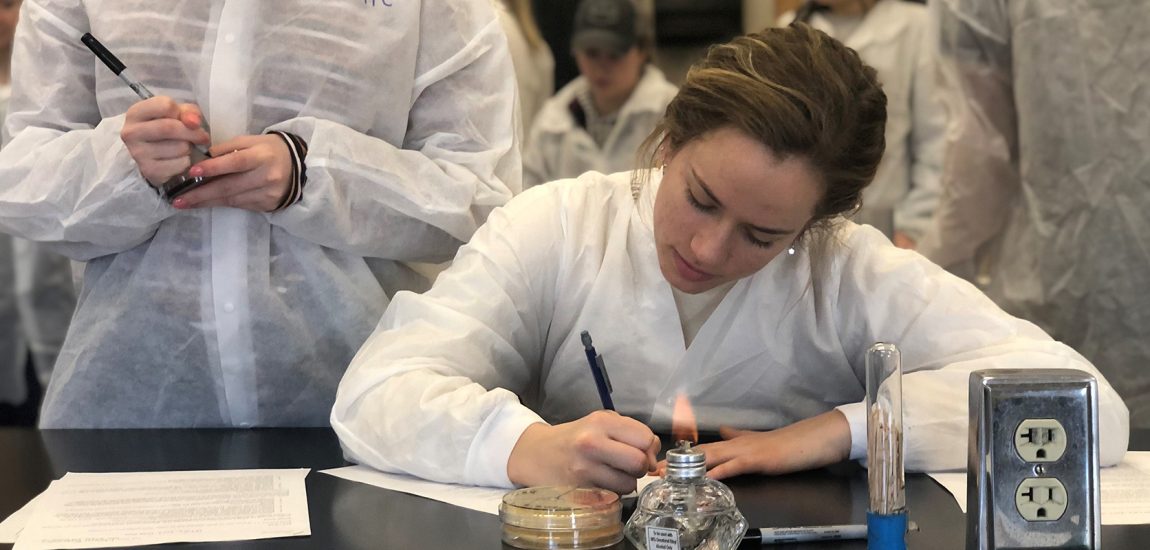Science exists because of God, not instead of God. Discover the miracle of how chemical processes interact to affect all living things. This degree will prepare you for a career in research, medicine, and other scientific and healthcare fields. This program focuses on carbohydrates, proteins, lipids, nucleic acids, and the processes of these molecules within living things.
This might be the right degree for you if you
- are passionate about serving
- interested in research in a rigorous program
- are interested in a career in research, medicine, or other scientific fields
Why study biochemistry at Northwestern?
This program challenges and prepares students for a job after graduation or graduate school. Northwestern offers off-campus research internships during the summer or for a semester. Organizations include the University of Minnesota, 3M, the County Department of Agriculture, and other biomedical research companies.
Our approach to learning together, teaching others, and applying knowledge in practical internships results in higher rates of employment and acceptance into graduate programs or medical schools.
With a campus so close to metropolitan areas, students take advantage of opportunities in Minnesota’s thriving healthcare industries.
Professors encourage students to explore God’s creation down to the smallest detail to gain a deeper understanding of His power. Students conduct original, leading-edge research under Christian faculty who are experts in their respective scientific fields. Small class sizes give students access to professors who take a personal interest in their futures.
Request Information
Careers in biochemistry
There are a variety of career and academic pathways that begin with a degree in biochemistry.
What types of work are related to this degree?
- Basic research
- Applied research
- Laboratory technician/ assistant
- Pharmaceutical sales representative
- Drug manufacturing
- Technical writing for related publications
- Biomedical equipment technician
- Food science or manufacturing
- Testing or product control
- Medical school
- Dental school
- Chiropractic school
- Physical Therapy school
- Veterinary school
- Public Health
What will I learn?
You will learn to think critically, research, and perform experiments to explore a range of scientific disciplines, including genetics, microbiology, forensics, and medicine.
BIO 4359
Biotechnology Lab
A laboratory course providing practical experience in operating chemical instrumentation and performing molecular biology techniques that may include spectroscopy, chromatography, assays, and manipulation of nucleic acids. Two to three hours of lab per week. A $200 laboratory fee required.
CHE 3101
Organic Chemistry I
The focus of CHE3101, in one word, is structure. The structures and geometries of carbon-containing molecules, including the topics of isomerism and stereochemistry, are examined in great detail using models and spectroscopic techniques. It is the structure of molecules which enables one to understand chemical reactivity. Types of reactions and mechanisms studied include simple substitution, addition and elimination. A $200 laboratory fee required.
BIO 1011
Principles of Biology I
A foundational course for science and preprofessional majors that includes introductory molecular and cellular structure and function, cellular and species continuity and introductory physiology. Intended for biochemistry, biology, engineering, health sciences, kinesiology, mathematics education, nursing or physical education majors or coaching minors. A $200 laboratory fee required.
PHY 1101
Fundamentals of Physics I
(PQ: C- or better in MAT1126 or ACT Math score of 24 or above [SAT-I Math score of 580 or above], or B- or better in high school (or college-equivalent) pre-calculus, trigonometry, or advanced algebra with trigonometry) This course stresses the use of fundamental principles to solve quantitative problems. Mechanics, rotations and waves. Motion in one dimension, vectors, motion in two and three dimensions, force and Newton’s laws, particle dynamics, work and energy, conservation of energy, rotational kinematics, rotational dynamics, angular momentum, fluids, oscillations, gravitation and other topics as time permits. Three lectures and one two-hour lab per week. A $200 laboratory fee required. Concurrent registration required in lecture and lab.

Still have questions about this program or how to apply?
Our team is ready with answers!
Discover the School of Science & Engineering
Professors at Northwestern are focused on their students first. Our faculty include experts in their respective fields who want to help you grow in your faith while you earn your degree.


